Marine insurance is a special type of coverage that handles risks in sea transportation. It includes hull and machinery insurance, cargo insurance, and more. These plans help protect ships, their cargoes, and other involved parties like businesses. So, knowing about the different marine insurance types is key for maritime companies.
Key Takeaways
- Marine insurance protects against a range of risks at sea, like vessel and cargo damage, and legal issues.
- The major marine policies are for ship damages, cargo losses, transportation costs, and legal liabilities.
- Ship damage insurance and cargo insurance are part of these policies for different protection needs.
- There’s also freight insurance for shipping costs and liability insurance for any legal challenges.
- Knowing the marine insurance options is vital for maritime businesses to handle their risks well.
Introduction to Marine Insurance
Marine insurance is key for businesses in marine operations. It covers risks like ship damage, cargo loss, and legal expenses. These risks can be costly. Marine insurance policies offer protection, helping businesses carry on and bounce back from shocks.
Why Marine Insurance is Crucial
The sea industry is full of risks like bad weather, accidents, and pirates. Marine insurance lessens these risks by paying for losses or damages. It gives businesses more stability and confidence. This helps protect their assets and profits.
Overview of Different Types of Marine Insurance Policies
Many marine insurance policies are available to meet marine industry challenges. These include:
- Hull and Machinery Insurance – Covers the ship and its parts.
- Cargo Insurance – Shields goods transported by sea, air, or land.
- Freight Insurance – Protects the revenue from shipping goods.
- Liability Insurance – Covers legal costs from harm done by the ship or crew.
Each policy type is vital in handling the varied risks of the sea business. They help ensure smooth and safe operations of ships, cargo, and transportation.
Hull and Machinery Insurance
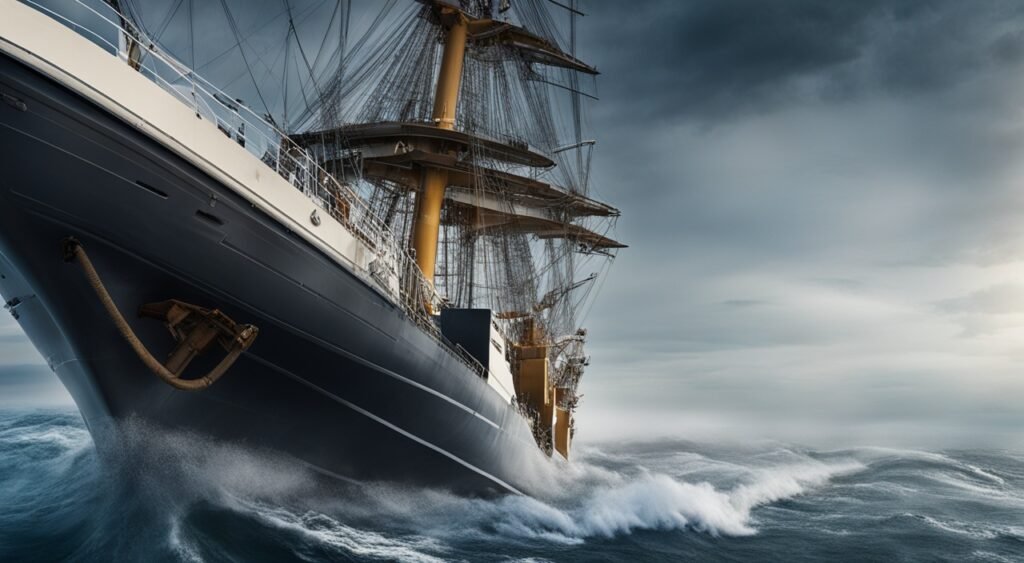
Hull insurance and machinery insurance are key in marine insurance. They keep ships and their operations safe. They protect against many dangers, keeping the industry strong.
Scope of Hull Insurance
This insurance covers a ship’s body, its gear, and things inside. It protects against collisions, fires, sinking, and other harm. Without it, the ship couldn’t keep up its work of moving goods and people safely.
Machinery Insurance Coverage
Machinery insurance looks after a ship’s essential parts. It includes the engines and boilers. This part is about quickly fixing problems to keep the ship running well. It’s crucial for the ship’s functionality and efficiency.
Together, hull insurance and machinery insurance are a big safety net. They help maritime businesses keep going even after accidents. They avoid major financial hits and keep the ships running smoothly.
“Investing in robust hull and machinery insurance is a prudent move for any vessel owner or operator, as it provides the peace of mind and financial security necessary to navigate the unpredictable waters of the maritime industry.”
| Coverage | Hull Insurance | Machinery Insurance |
|---|---|---|
| Scope | Vessel structure, equipment, and furnishings | Engines, boilers, and critical components |
| Protections | Collisions, fires, sinking, physical damage | Breakdowns, malfunctions, and other equipment-related incidents |
| Importance | Maintains vessel integrity and seaworthiness | Preserves overall functionality and efficiency of maritime assets |
Cargo Insurance
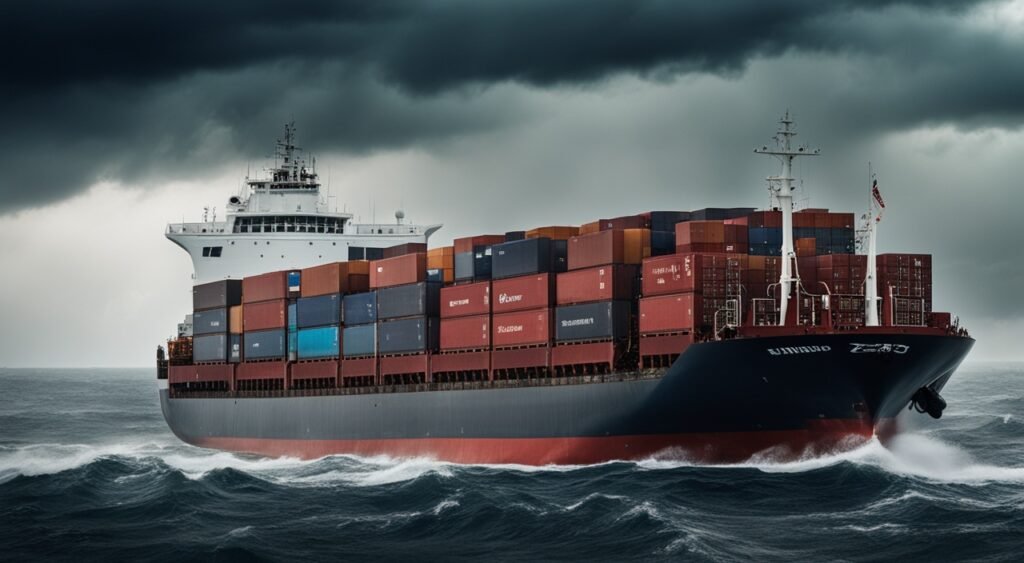
Cargo insurance is a critical marine insurance type that protects goods during their trip. It covers the cargo’s value against risks like damage or theft. This insurance is key for businesses in international trade, reducing the financial risks of moving goods.
These policies protect a wide range of cargoes, from materials to household items. They guard against physical damage, loss, and theft during transport.
Cargo insurance is crucial for businesses trading globally. It helps handle the big financial risks of moving goods. With this safety net, companies can focus on their business more confidently.
| Coverage Aspect | Description |
|---|---|
| Physical Damage | Protection against breakage, collision, or natural disasters affecting the cargo. |
| Theft | Protects against loss due to theft or pilferage during transport. |
| Delay | Offers compensation for financial losses from cargo delivery delays. |
| Liability | Protects against damage or loss liability to others during cargo transport. |
Policies can be customized for different business needs, keeping goods safe during transport. With the right coverage, companies protect their operations and finances in the global arena.
“Cargo insurance is not a luxury, but a necessity for any business involved in international trade and transportation. It’s the safety net that allows us to navigate the risks of the global marketplace with confidence.”
Freight Insurance
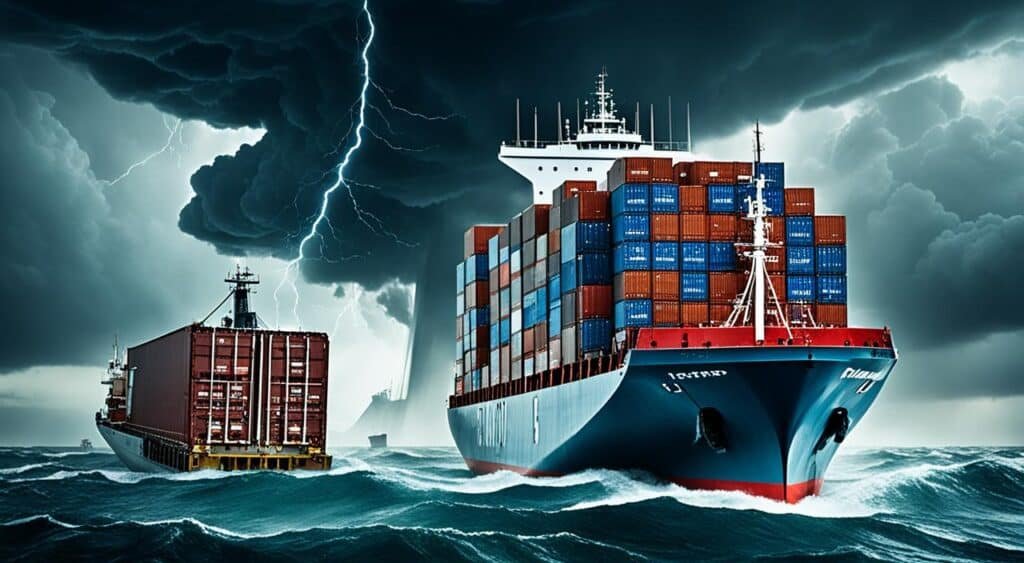
Freight insurance is key for companies in maritime shipping. It safeguards businesses from big losses. This kind of coverage includes the loss of cargo during its journey. It can be for a single shipment or for many under one policy.
Specific and Open Freight Insurance
Specific freight insurance covers just one shipment. It ensures the goods’ value is safe if they are lost or damaged. Open freight insurance is broader, covering many shipments. It is favored by companies shipping often.
Importance of Freight Insurance
For businesses using maritime shipping, freight insurance is a must. It helps protect the company’s income if something goes wrong with a shipment. This could be due to damage, loss, or unforeseen delays.
Such coverage is crucial for financial stability and smooth operation. It allows companies to keep going even after a loss. This is vital for businesses needing their cargo to arrive on time for revenue.
“Freight insurance is a critical safeguard for businesses that rely on maritime transportation. It provides the financial protection they need to weather unexpected events and continue to serve their customers effectively.”
| Type of Freight Insurance | Coverage | Benefits |
|---|---|---|
| Specific Freight Insurance | Covers a single shipment | Protects the value of a specific cargo transportation |
| Open Freight Insurance | Covers multiple shipments under a single policy | Provides comprehensive coverage for businesses with regular maritime transportation needs |
Marine Liability Insurance
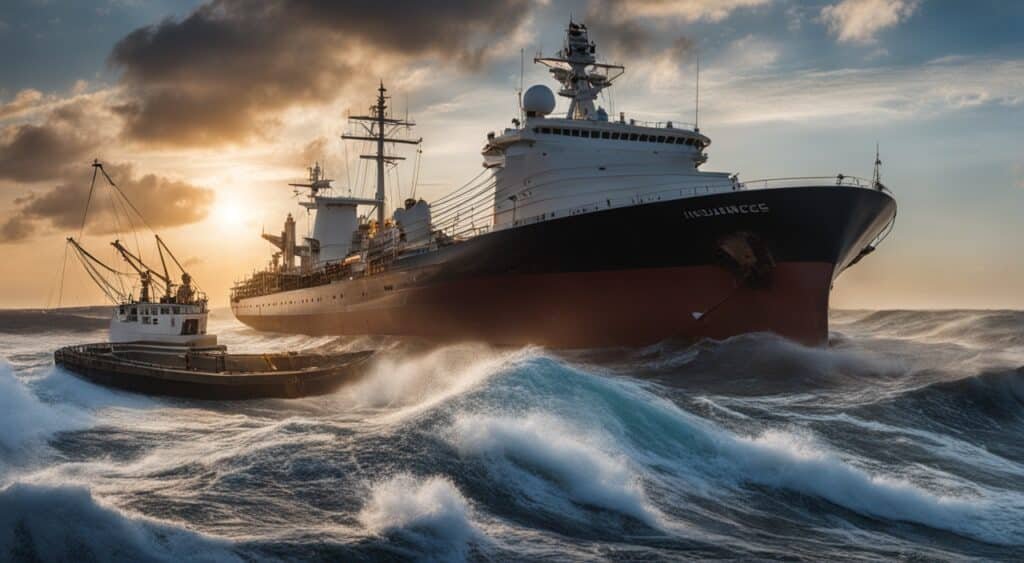
In the maritime industry, liability insurance is key for business protection. It shields companies from major financial hits due to legal claims. This insurance covers legal risks like personal injury, property damage, pollution, and more.
Protection and Indemnity (P&I) Insurance
Protection and indemnity (P&I) insurance is a major part of this. It protects shipowners from legal responsibilities. This includes cases of injuries or illnesses onboard and damage to other ships caused by yours. It also covers pollution, collision, and similar risks.
Charterers’ Liability Insurance
Charterers’ liability insurance is vital too. It shields the charterer, who’s leasing the ship. It covers damage to the leased ship and financial losses or claims related to it.
Ship Repairers’ Liability Insurance
Ship repairers also need their own coverage. Their insurance protects against claims for damage to ships under repair. This helps lower the financial risks of lawsuits against repair companies.
Marine liability insurance is crucial for maritime businesses. It helps companies handle the costs and fallout from various legal liabilities. This includes personal injuries, property damage, and other potential claims.
Marine Insurance
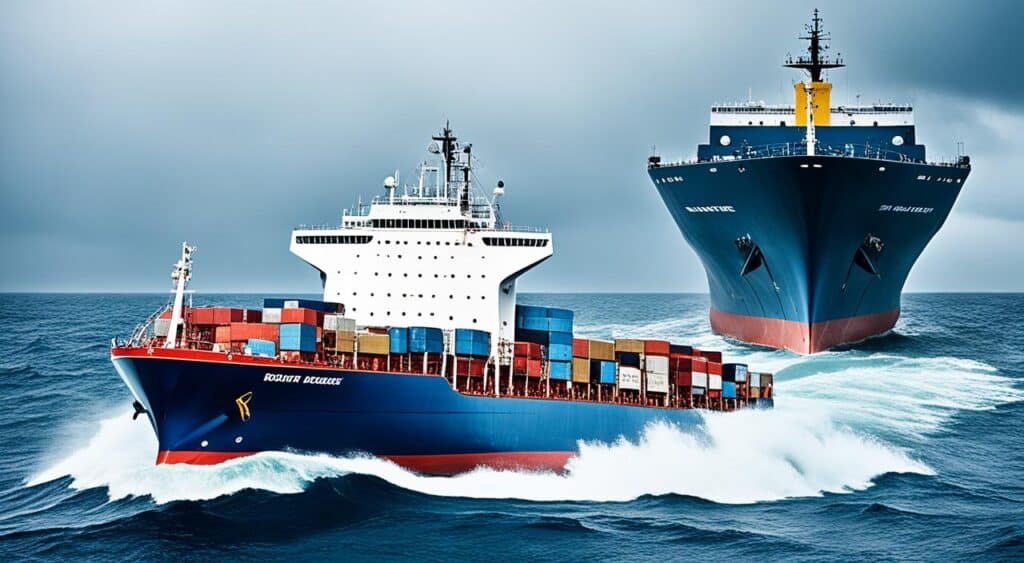
Marine insurance protects businesses in sea-related work. It covers many risks, like boat damage and lost cargo. This type of insurance is essential for those working on the water.
It helps companies deal with the dangers of their work. So, they can keep running even if bad things happen.
Types of Marine Insurance Policies
This insurance comes in different types to meet various needs.
- Hull and Machinery Insurance: This protects the ship and its parts from harm.
- Cargo Insurance: It covers loss or damage to the items being carried by sea.
- Freight Insurance: This insurance makes sure money from shipping goods is safe if there are any delays.
- Marine Liability Insurance: It handles legal issues from running ships, including charterers’ liability.
Each policy type deals with its unique set of risks. This tailored approach helps ship businesses stay safe and keep moving.
| Type of Marine Insurance | Key Coverage |
|---|---|
| Hull and Machinery | Damage to the ship and its parts |
| Cargo | Damage to or loss of transported items |
| Freight | Guards the expected income from shipping goods |
| Marine Liability | Handles the legal problems from ship operations |
Choosing the right marine insurance is crucial for ship businesses. It helps them deal with risks well. This way, they can keep their shipping operations going.
“Marine insurance is vital for maritime businesses. It shields them from the sea’s unpredictable dangers.”
Time and Voyage Policies
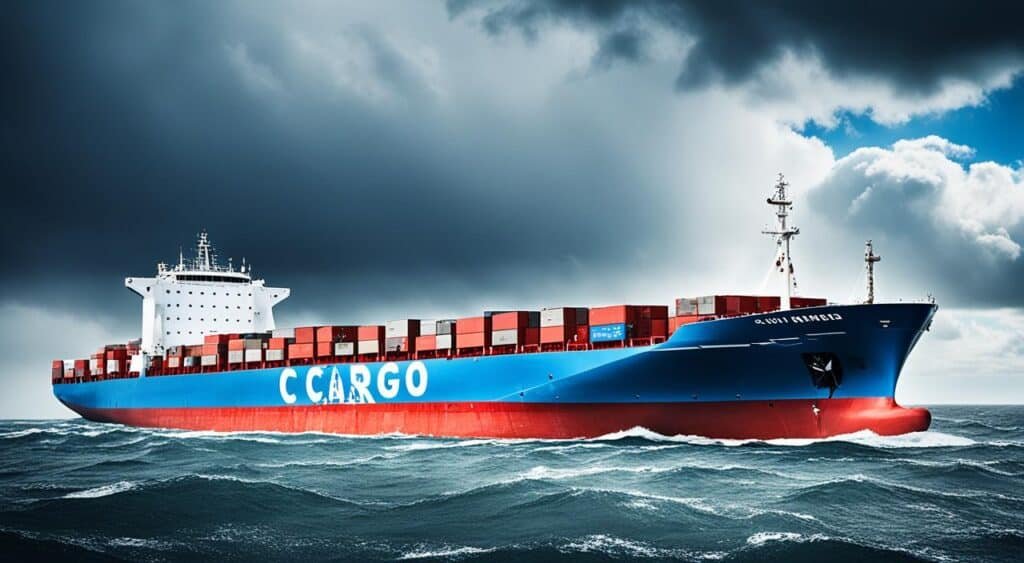
In marine insurance, policies come in two main types: time policies and voyage policies. Time policies last for a set period, usually a year, and protect your ship or cargo. Voyage policies cover you for one trip from start to finish. Businesses choose the best one for their shipping needs.
Time Policies
Time policies protect boats or goods for a year, no matter where they go. They’re great for companies with regular shipping or a lot of ships. Owners with a big fleet often pick these.
Voyage Policies
Voyage policies work for one trip at a time. They’re perfect for companies that ship items occasionally and go different places each time. Each trip gets its own coverage.
Some companies like policies that mix both time and voyage. This way, they’re covered for both regular and single trips, providing the flexibility they need. They work well for those with a mix of shipping schedules.
| Policy Type | Coverage Duration | Key Characteristics |
|---|---|---|
| Time Policy | Specified period (typically 1 year) | Covers multiple voyages during the agreed-upon timeframe |
| Voyage Policy | Specific maritime journey | Protects the insured during a particular maritime expedition |
| Mixed Policy | Combination of time and voyage | Provides coverage for voyages undertaken during a specified time period |
It’s important to know the differences between these marine insurance types. This helps maritime businesses choose the right coverage for their shipping needs. Understanding your options is key to picking the best policy.
Valued and Unvalued Policies
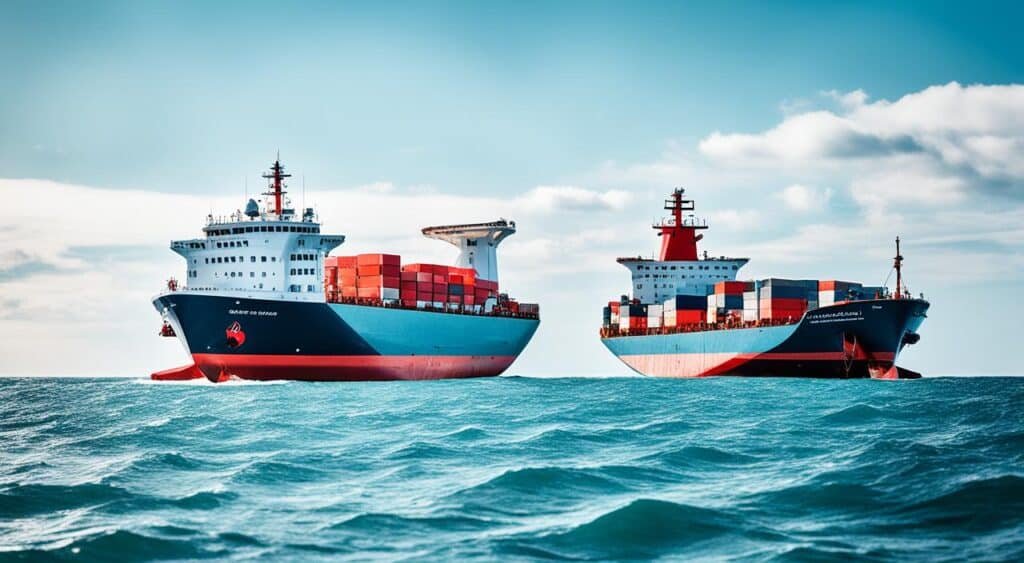
In marine insurance, policies are seen as either valued or unvalued. It’s key for maritime businesses to know the difference. This understanding helps them manage risks effectively.
Valued Marine Insurance Policies
A valued policy sets the cargo’s value in the insurance contract. This declared value shows the maximum payout clearly. It helps businesses in their risk management by providing this known limit.
Unvalued Marine Insurance Policies
An unvalued policy doesn’t state the cargo’s value upfront. If there’s a loss, the payout depends on the actual value of the goods then. This means the payout is based on the current cargo or transportation value.
Choosing between valued and unvalued policies depends on the business’s needs. They consider the goods, market changes, and how certain they wish to be about their coverage. These factors help decide the best type of policy.
| Valued Policy | Unvalued Policy |
|---|---|
|
|
Being clear on the differences between valued and unvalued marine insurance policies helps businesses. It lets them make choices that fit with their risk strategies and unique transportation needs.
Also Read : The Benefits Of Life Insurance At Every Stage Of Life
Fleet and Block Policies
In marine insurance, fleet and block policies are key. These help businesses with many different marine activities. They offer full coverage at a good price.
Fleet Policies for Multiple Vessels
A fleet policy covers many vessels owned by the same company. This way, a business can protect its whole fleet with one policy. It makes everything easier and cheaper. Companies can cover all their vessels this way.
Block Policies for Multi-Modal Transportation
Block policies, on the other hand, cover cargo across different ways of travel, like by sea, land, or air. This helps businesses who use different carriers and means of transport. With a block policy, companies know their cargo is safe, no matter how it travels.
Fleet policies and block policies are vital in marine insurance. They let companies look after their ships and goods better. This way, they’re covered against many risks, like ship and machinery damage or losing their cargo.
“Tailored marine insurance solutions, such as fleet policies and block policies, empower businesses to navigate the complexities of the maritime industry with confidence and peace of mind.”
Conclusion
Marine insurance is crucial for companies in the maritime sector. It offers different policies like hull and machinery, cargo, freight, and liability insurances. These cover various risks businesses face in maritime activities. Knowing these policies helps businesses choose the right insurance to manage their financial risks well.
Having the correct marine insurance keeps maritime businesses safe from sudden losses. It protects ships, cargoes, and lessens liability risks. This type of insurance is vital for the success of maritime companies. It lets them operate with more certainty and strength in the maritime world.
Marine insurance is a key part of risk management for those in maritime transportation. It uses many policies to help companies deal with specific maritime risks. This insurance is fundamental for the ongoing success of maritime operations.
FAQs
Q: What is marine insurance?
A: Marine insurance is a type of insurance policy that provides coverage for marine-related risks such as damage to ships, cargo, terminals, and any transport by which property is transferred, acquired, or held between the points of origin and final destination.
Q: What are the types of marine insurance policies available?
A: There are mainly two types of marine insurance policies available – ocean marine insurance and inland marine insurance. Ocean marine insurance typically covers property transported over water, while inland marine insurance covers property in transit over land or air.
Q: What does an ocean marine insurance policy cover?
A: An ocean marine insurance policy covers risks associated with the transportation of goods over water. It typically includes coverage for cargo, hull damage, liability, and other related risks.
Q: What is an inland marine insurance policy?
A: Inland marine insurance is a type of insurance that covers property that is movable or transportable in nature. This can include property in transit, property held by a bailee, and other types of property that are not covered by standard property insurance policies.
Q: How does marine insurance help in risk management for boat owners?
A: Marine insurance helps boat owners manage the financial risks associated with owning and operating a boat. It provides coverage for damage to the boat, liability protection, and other risks that may arise while using the boat.
Q: What is a deductible in a boat insurance policy?
A: A deductible in a boat insurance policy is the amount of money that the policyholder must pay out of pocket before the insurance company will start covering the costs associated with a claim. It is a way for insurers to share the risk with the policyholder.
Q: What are the coverage options available in marine insurance?
A: Marine insurance offers various coverage options depending on the type of policy and the specific needs of the policyholder. Some common coverage options include hull insurance, cargo insurance, liability coverage, and protection and indemnity insurance.
Source Links
- https://www.marineinsight.com/maritime-law/different-types-of-marine-insurance-marine-insurance-policies/
- https://securenow.in/insuropedia/what-are-the-types-of-marine-insurance/
- https://www.tataaig.com/knowledge-center/marine-insurance/types-of-marine-insurance




